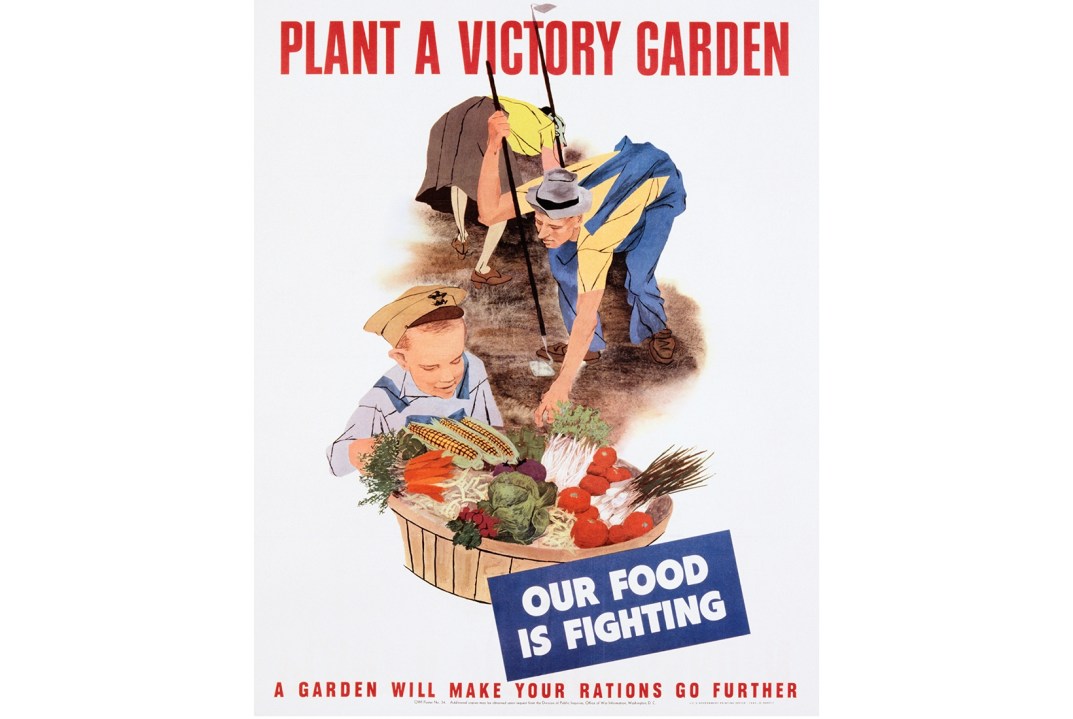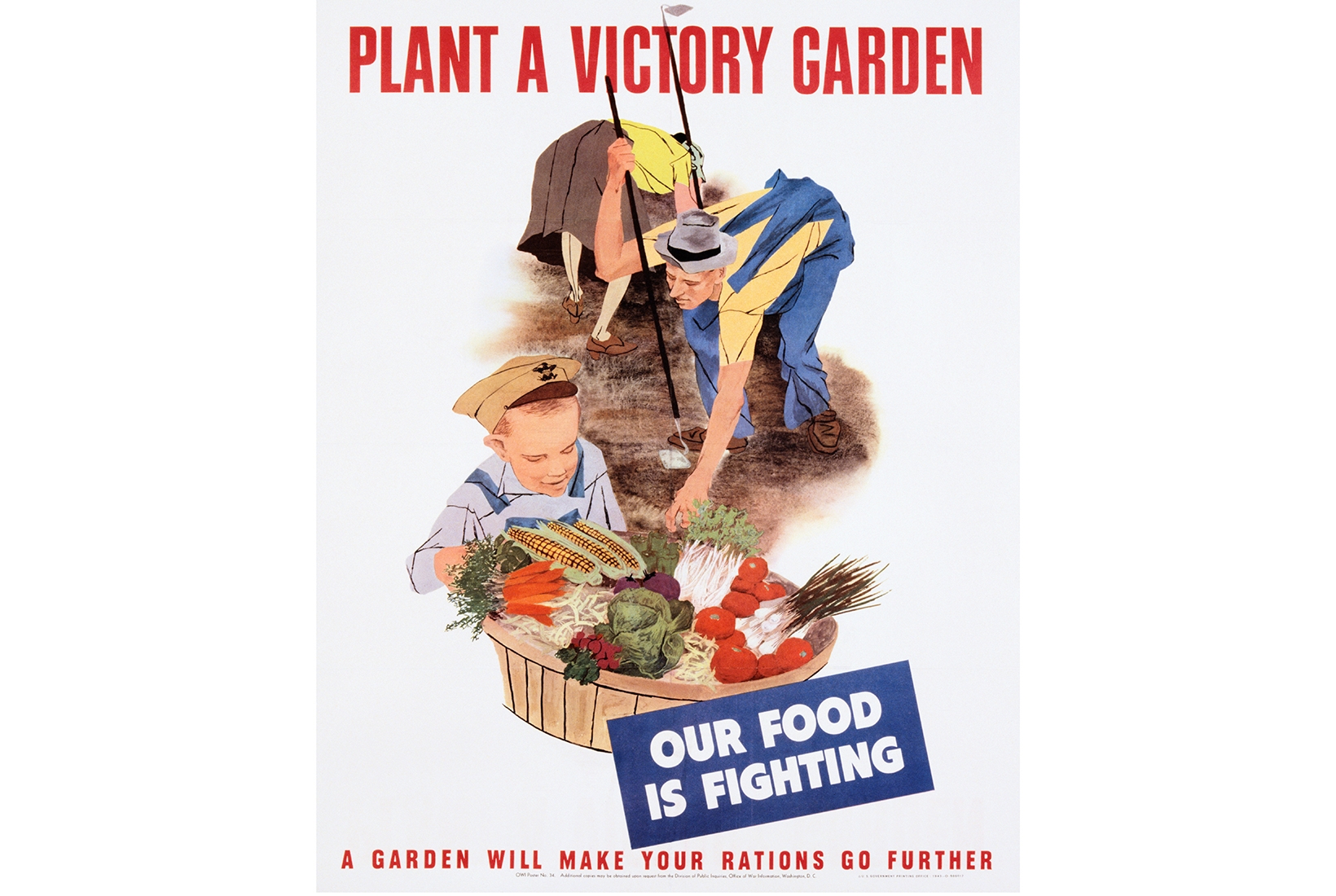The American diet was probably at its healthiest in the second world war. Fearing interruption to supply chains, Washington launched a national Victory Gardening programme within a fortnight of Pearl Harbor, and saw two thirds of the population heed the cry to fill their backyards, rooftops and window boxes with veg. The scheme was so successful that, by 1943, home-gardeners were producing 43 per cent of all fresh food consumed.
‘Dig for Victory’, the latest episode of Gastropod, a superbly researched food and science podcast, opens with the co-hosts Cynthia Graber and Nicola Twilley rustling bags of manure as they attempt to plant tomatoes, peppers and ‘urbs’ in a tiny patch of earth in New York. The pandemic has seen a rush on garden centres on both sides of the Atlantic and revival of the Dig for Victory tag. Prompted by the sight of empty supermarket shelves, Graber and Twilley sow their seeds and journey back and forth between the history of victory gardens and future of urban farming.
Gastropod, now in its 14th series, is the least podcasty of podcasts I have heard for a while. By that I mean it’s heavy on facts, light on chat and, I would say, entirely scripted (though the presenters do a good job of softening the lines). It’s almost the audio equivalent of a long-form New Yorker article, replete with citations and warnings over the bias of sources. There’s little humour or lightness of touch, but it works, especially when the topic is as controversial as pizza. The choice of banana as a topping, debated in a recent episode, is no laughing matter.
Gardening is ‘literal worship manifesting food, beauty, community and habitat out of air, soil, water’
Growing veg, the podcasters discover, is harder than it looks. Not for nothing did Ogden Nash complain of taking up his ‘hoe for a sword’ and toiling like ‘Job or Buddha’, only for nothing to turn out ‘the way it shudda’. By 1945, unsurprisingly, the Americans had had enough, and traded their home-grown kale for tinned and ready-made foods. It was all downhill from there.
The recent resurgence of gardening follows the growth in the use of shipping containers and even skyscrapers as urban plots. So-called ‘vertical farms’ apparently use less water than their traditional counterparts, but can cost twice as much in energy if they’re powered by the grid. Smaller-scale gardens, like the thousands that have sprung up in Detroit over the past decades, offer a greener solution. Corona-gardening may just be our salvation.
Cultivating Place is a popular natural history and gardening podcast hosted by NPR. Each week, the presenter Jennifer Jewell interviews a guest, typically a nature writer, and offers some reflections. Last week, she was talking to Kathryn Aalto, a garden designer, about her book on female ramblers. Dorothy Wordsworth and Diane Ackerman, a contemporary writer Aalto likened to ‘a lush red cabernet’ for her sensual prose, provided the chief focus.
The discussion was fine. It was when Jewell cut in with her personal observations that the pace began to change. Gardening, she philosophised, is ‘literal worship manifesting food, beauty, community and habitat out of air, soil, water and hand-in-hand engagement with these elements’. As for our gardens, they’re ‘individual prayer rugs’. She borrowed the second quote from a contemporary scholar of ‘the mythic imagination’ as it ‘registered’ in her core.
Jewell took the metaphor further, visualising the fabric of a garden ‘as a series of seed stitches’ binding her to nature, and tree rings as adding ‘to the girth of our experience’. She has a lovely soothing voice, not unlike that of a meditation or yoga teacher, and is clearly well informed, but at this point I felt like the cynic in the class, thoughts wandering, eyes looking around the room, unable to slip into the happy zone.
I dare say this was largely down to my reserve — I am not one for ‘amplifying’ to help ‘others’ voices ripple out’ — but I think it also has something to do with the wider gardening-as-therapy narrative. The mental-health benefits of gardening are well documented — nothing beats getting outside for getting outside of yourself. But there is more to it than that. Gardening feeds the stomach and the imagination as much as it does the soul. For me, at least, plants work best as stimuli to think, not vegetate.
For practical gardeners, I recommend Jane Perrone’s On the Ledge, a down-to-earth guide to indoor plants, dehydrated plants, top soil and aphids. A recent episode, on the flaws of AI-powered plant-identification apps, reawakened my interest in my lockdown seeds and had me dreaming of feeding the county with my radishes. If Google Lens can confuse a Swiss cheese plant for a fern leaf cactus, and continue to be downloaded, there’s hope for this Boycie yet.







Comments